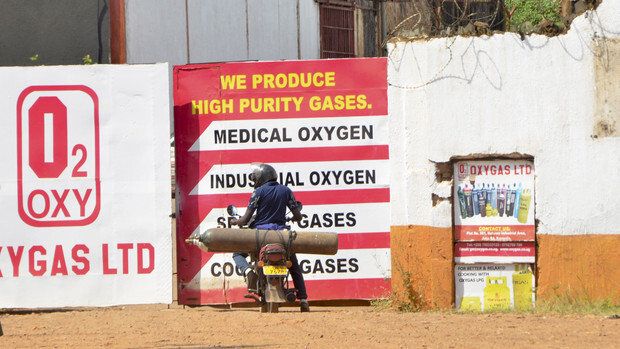The government has warned health workers and caregivers against administering oxygen to Covid-19 patients while at home or other undesignated places.
This comes as the country battles the second wave of the pandemic which has seen an increase in the number of Covid-19 cases and demand for oxygen.
“The public is urged to desist from this dangerous practice with immediate effect. Furthermore, health workers … administering oxygen in undesignated hospitals should immediately stop this malpractice,” Dr Henry Mwebesa, the director general of Health Services, said in a June 18 statement.
Dr Mwebesa said oxygen is a Class A medical supply required to be monitored and regulated by a trained health worker upon proper prescription by qualified medical personnel.
He observed that a haphazard oxygen administration, particularly in homes of those with means to afford, has resulted in the deterioration of patients who cannot be helped when rushed to hospitals as an after-thought at the last minute.
“The public should note this is very dangerous to the lives of their patients and the entire household where such administration is taking place,” Dr Mwebesa said.
He added: “… a number of patients are deteriorating because of receiving either lower or higher oxygen doses as the different severity levels may demand. We are even not sure whether or not the oxygen being used is medical oxygen or industrial oxygen and not every Covid-19 positive patient requires oxygen therapy.”
Oxygen abuse can be toxic to vital body organs including the brain, according to experts.
Other problems associated with misuse of oxygen, which is highly flammable, are possible explosion and fire, or overdose and or under – all of which can lead to death.
Ms Annet Birungi, a senior nurse and treasurer of Uganda Nurses and Midwifes Union, said many patients are kept at home and given oxygen before assessing whether they need additional oxygen or not.
An operator of a bedside nursing service, she said while it is true that hospitals are overwhelmed with Covid-19 patients, those attending to them at home or private facilities must have equipment to monitor oxygen levels.
“The bedside caregivers should be allowed to go with oximeter to see whether the oxygen circulation is high or sufficient so that you know that this person needs oxygen and refer the person to the best hospital or health facility rather than staying with the patient and you are not monitoring anything,” Ms Birungi said.
Oxygen saturation in the body is measured using a pulse oximeter, a small clip-type device attached either to the finger or ear lobe, and a patient may require to be put on oxygen if the amount of oxygen drops below 90.
Dr Alex Kakoraki, a general physician based at Murchison Bay Hospital in Luzira, Kampala, said there is a lot required when it comes to using oxygen effectively at home.
“For example, one has to have a patient monitor, a device that is fixed onto the patient’s vital areas so that while they receive oxygen, other elements are being monitored including blood pressure, respiratory rate levels, temperature, among others,” Dr Kakoraki said.
He added: “Medicated oxygen is concentrated and has to be breathed in under a certain pressure, hence the need for medical personnel to be on sight to monitor patients [throughout].”
Dr Kakoraki strongly discouraged Covid-19 patients from using oxygen at home when unsupervised by qualified healthcare professionals.
However, patients who have experienced the oxygen shortage crisis in hospitals think the ban will affect them adversely.
A recovering Covid-19 patient, who preferred anonymity, told this website that because of the crisis in hospitals, many patients including himself opted for private arrangements, which worked.
“Hospitals are failing us and it is why we have decided to look for the oxygen and handle the treatment ourselves,” he said.
Meanwhile, Roofings Limited as well as Oxygas Ltd, two private oxygen manufacturers, have been giving oxygen to public health facilities without charge.
Mr Stuart Mwesigwa, the business development and public relations manager at Roofings Group, which produces up to 2.5 million litres of oxygen every 24 hours, says they have tightened issuance of the gas to private individuals.
“We continuously get people coming here and telling us all sorts of stories so that we can give them oxygen. Some of these are unscrupulous businessmen and women taking advantage of the situation,” Mr Mwesigwa said.
He added: “They come here with the intention of buying oxygen and once they get out there, they sell it at a raised fee to desperate patients who end up misusing it at home and later dying.”
Do’s and dont’s of using Oxygen at home
A guide by University of Michigan Health on Using Oxygen at Home provides that a person who is put on oxygen at home should learn to use and take care of associated equipment.
The guide warns that since oxygen is a fire hazard, safety measures should be followed to keep the patient and family safe.
If you would like your article/opinion to be published on Uganda’s most authoritative news platform, send your submission on: [email protected]. You can also follow DailyExpress on WhatsApp and on Twitter (X) for realtime updates.



